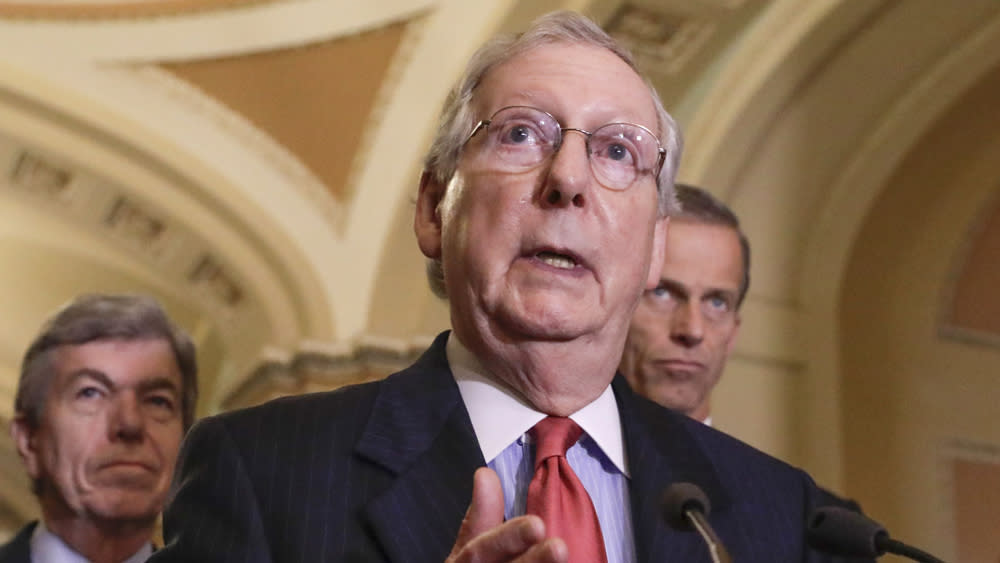How Showbiz Would Feel Impact of a Government Shutdown

In a little more than two days, funding for the federal government will expire and, unless Congress comes to an agreement on a new spending plan, there will be a shutdown.
On Wednesday, there were few signs on Capitol Hill that lawmakers were coalescing around a plan. Rather, Senate Majority Leader Mitch McConnell pitched a short-term spending bill that includes a six-year extension of a program to fund children’s health care, one of the Democrats’ key priorities. Yet Senate Minority Leader Chuck Schumer said a four-week bill merely “kicks the can down the road,” and Democrats want a funding bill to include protections for undocumented immigrants who came to the U.S. as children.
The issue of those immigrants — known as “dreamers” — is at the heart of the impasse, and adding to the confusion is what President Donald Trump would be willing to accept when and if a spending bill that addresses immigration makes it to his desk.
A bipartisan immigration agreement was sidelined last week after the now-infamous meeting in which Trump, in rejecting the deal, reportedly used the word “s—hole” to describe African countries with emigres seeking protection in the U.S.
“As soon as we figure out what he is for, then I would be convinced that we were not just spinning our wheels,” McConnell told reporters.
So far, among many in D.C., the possibility of a shutdown has been weighed more in political terms (like who would take the blame) than in the practicalities of the situation (like what exactly would grind to a halt). But it’s safe to say that a shutdown will be on many people’s minds by Friday evening, with just hours to go before the midnight deadline, if things are still where they are now.
Here are a few areas that could impact the entertainment industry, based in part on the last time the federal government shut down for 16 days in 2013.
National parks. Almost all parks and forests are likely to close, in what is the most visible impact of a shutdown for much of the public. In 2013, that also included closing off access to filmmakers, and movies like “Wild,” starring Reese Witherspoon, had to scramble to find new locations. The same goes for shooting on other federal lands and locales in Washington.
FCC. Almost all of the staff was furloughed in the 2013 shutdown, bringing to a halt everything from the processing of license applications to the review of pending mergers. The FCC this year is nearing the end of its review of Sinclair’s proposed acquisition of Tribune Media, so a shutdown could mean a delay to that transaction. The FCC’s next scheduled meeting is Jan. 30, where a proposal to establish an office of economics and analytics is on the agenda.
Justice Department. The DOJ has a major antitrust case pending against AT&T and Time Warner, with a very tight time frame, and a shutdown could scramble that schedule. While the Justice Department’s contingency plan for such a scenario calls for criminal litigation continuing “without interruption,” civil cases are different. According to the plan, litigators in civil cases “will continue to approach the courts and request that active cases, except for those in which postponement would compromise to a significant degree the safety of human life or the protection of property, be postponed until funding is available. If a court denies such a request and orders a case to continue, the Government will comply with the court’s order, which would constitute express legal authorization for the activity to continue.”
In the 2013 shutdown, the courts themselves continued to operate on reserve funds, but there were postponements in some proceedings, and there was some concern back then that operations would be scaled back had the shutdown gone on much longer.
Public broadcasting. The Corporation for Public Broadcasting, the nonprofit that distributes government grant money to public stations, PBS, and NPR, operates on a two-year advanced appropriation schedule. Its operations and programming continued uninterrupted in 2013, and would presumably do so again if there is a shutdown this year.
Arts agencies. The last shutdown meant the closure of the Smithsonian’s museums and the National Zoo. Even the zoo’s Panda Cam was turned off, although the animals were still cared for and fed. The shutdown did include the federal government’s two arts agencies, the National Endowment for the Arts and Humanities. That meant a delay in the distribution of grants to artists, filmmakers, and scholars.
Related stories
Jeff Flake Blasts Trump for Attacks on the News Media
White House Press Secretary: If Trump Were Racist, Why Did NBC Give Him 'The Apprentice'?
Subscribe to Variety Newsletters and Email Alerts!


